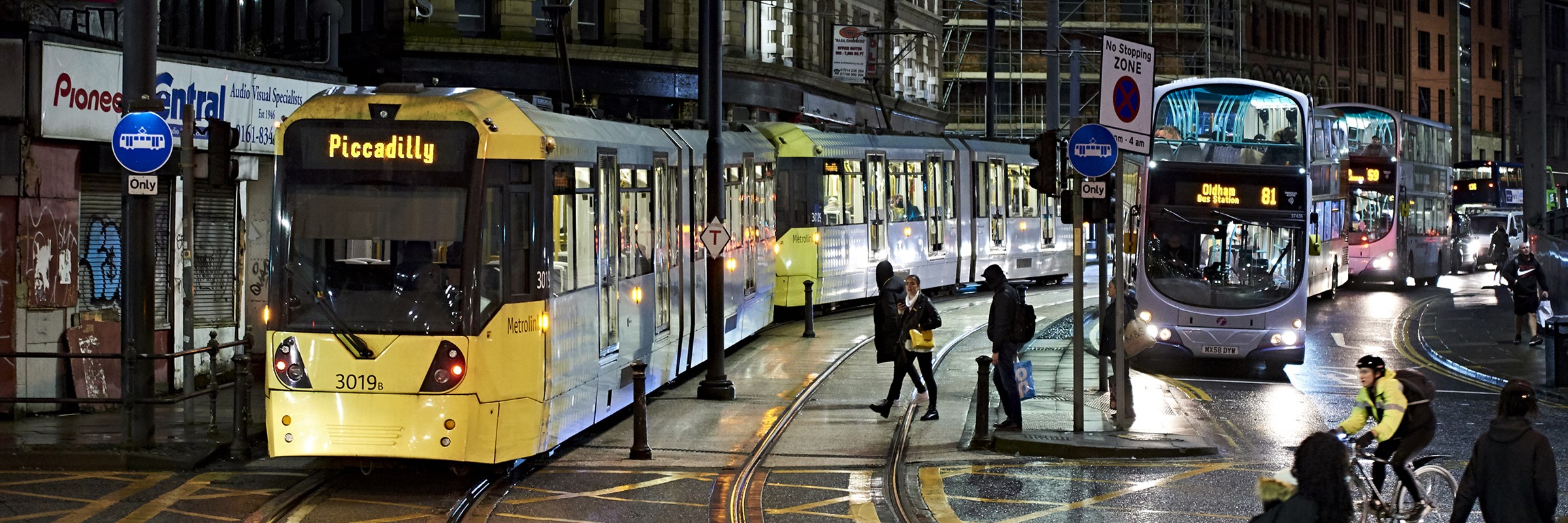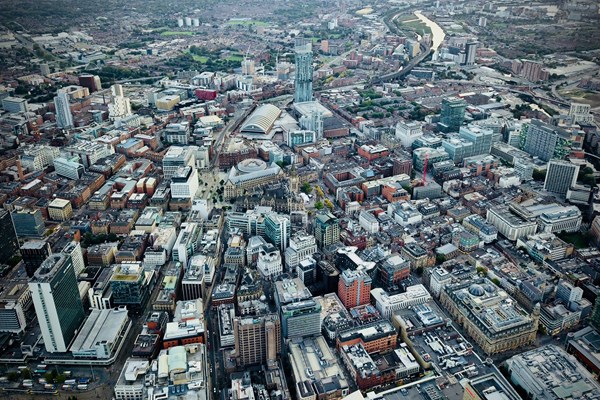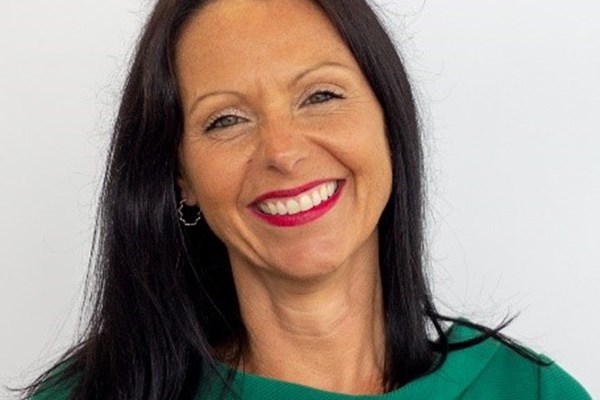
Greater Manchester Leaders move to decision on bus franchising for the city-region
- Major milestone for Greater Manchester’s ambitions for integrated transport network
- Greater Manchester Combined Authority recommended to request that the Mayor introduces bus franchising
- Reports published today show significant support for franchising
- Mayor of Greater Manchester to make final decision on franchising at later date
- Greater Manchester would be first city-region outside London to operate fully franchised and locally accountable bus system
Greater Manchester Leaders will meet later this month to consider a major milestone in its plans for an integrated transport system; the introduction of bus franchising across the city-region.
Currently in Greater Manchester, individual bus companies decide the routes, fares, timetables and standards. There is no coordination and limited oversight. Since 1986, bus patronage fell by 45% from 350m to 194m in 2018 and the bus network has continued to shrink. There are more than 150 different types of bus ticket; and a single bus ticket can cost £4 (compared to £1.55 in London) and often does not allow passengers to transfer between buses or other types of transport. Where bus companies decide not to run services and where necessary, the public sector pays to fill the gaps.
Franchising means bus services – including routes, frequencies, fares and standards – would be brought under local control. Greater Manchester Combined Authority (GMCA) would coordinate the bus network based on what passengers need and would also coordinate investment. The bus operators would be commissioned by GMCA to run the services. It would also allow GMCA to integrate buses with the rest of transport network.
Greater Manchester is the first ever city-region in the UK to use the Bus Services Act 2017 to reach the stage of deciding whether to franchise its bus network as part of an integrated transport system. If the decision is made to proceed with the proposed bus franchising scheme it would be the biggest change to Greater Manchester’s bus network since deregulation in 1986 and would make Greater Manchester the only city-region outside London to operate a fully franchised and locally accountable bus network.
More than 12,500 consultation responses were received in total on GMCA’s proposals to change how buses are run. Of those who answered the question ‘To what extent do you support or oppose the introduction of the proposed franchising scheme’ or submitted a response via an organised campaign, 86% of responses to the first consultation period supported the franchising scheme. This was 82% for the second consultation period. All consultation responses were independently managed and analysed by Ipsos MORI.
Sir Richard Leese, Deputy Mayor of GMCA, said: “Buses are central to our public transport network, with three out of four journeys made by bus, but it has been clear for a long time that our buses could be better. We have now held consultation over two periods on a proposed franchising scheme and have asked for people’s views on the proposals in light of the Covid-19 pandemic. In both consultation periods, there were high levels of support for franchising and the benefits it would bring for the future of Greater Manchester’s buses.
“People, businesses and other organisations have overwhelmingly told us that they want change. They want buses that are easier to use, with services that connect to each other and other forms of public transport. They want simpler fares and tickets and they can also see the wider benefits of franchising for the city-region and our recovery from the Covid-19 pandemic.
“Greater Manchester has always been a trailblazing city-region; we’ve led the way in computing, music and engineering and now we could be the first city-region outside London to have our own fully franchised and locally accountable bus network.
“However, if franchising was to proceed, it would be a complex and long process – as the current bus network has been broken for over 30 years, it wouldn’t be fixed overnight. But it would deliver benefits over the longer term.
“It’s important to note no decision has been made at this stage. GMCA needs to consider the outcome of the consultation and decide if it wants to make the recommendation to the Mayor. Then the decision would be for the Mayor of Greater Manchester to make at a later date.”
A GMCA report on bus franchising, alongside a suite of supporting documents, finds that franchising remains the best opportunity to achieve GMCA’s objectives for an integrated network, with simpler fares and tickets, a better customer experience and overall value for money, despite the potential impact of Covid-19.
The report also considers whether now is an appropriate time to make a decision on franchising, taking into account various other factors. It finds:
- There is substantial support for taking a decision on franchising now, from local authorities, academic institutions and the public. However, some have suggested a decision should be delayed until more is known on the impacts of Covid-19
- GMCA’s objectives for the bus market remain the right ones
- Despite the uncertainty of the current situation, the use of scenario-based analysis in the Covid-19 Impact report enables a decision to be taken with a good understanding of this uncertainty
- The flexibility of the proposed franchising scheme would also work across a number of different scenarios and a range of outcomes
- Further information becoming available on Covid-19 would not fundamentally alter the uncertainty around the pandemic or provide more evidence for decision-making.
The report concludes that making a decision on franchising now is appropriate and would enable GMCA to support the long-term recovery of the bus market and the wider society and economy of Greater Manchester.
The report and a suite of supporting documents will first be considered by the Housing, Planning and Environment Overview and Scrutiny Committee on Friday 19 March, and then GMCA at a special meeting on Tuesday 23 March, where leaders will be asked to consider and decide whether to recommend the franchising scheme to the Mayor. The Mayor will then decide whether or not to proceed with the scheme at a later date, no earlier than 25 March.
If the decision is made to proceed with the proposed bus franchising scheme; to make the transition to franchising as smooth as possible the proposed franchising scheme will be introduced in three phases, with one sub-area introduced each year between 2023 and 2025*.
Notes to Editors
The GMCA report and supporting documents have been published today (opens new window) ahead of the Housing, Planning and Environment Overview and Scrutiny Committee on Friday 19 March.
The proposed funding arrangements for the franchising scheme were approved by GMCA in November 2020 and total £134.5m. This includes:
- £78m of earn-back funding provided by central Govt as part of the devolution deal;
- £11m already raised by the existing Mayoral precept to date;
- £17.8m of one-off contributions raised by local authorities;
- £22.7m of Mayoral precept from future years’ budgets – although the Mayoral precept will remain frozen in 2021-22
This funding remains available to GMCA.
* The three sub-areas during the transition period would be:
Sub Area A includes bus services running within and from the north west of Greater Manchester. This includes the Bolton and Wigan Council areas as well bus services running through parts of Salford and Manchester from the west of Greater Manchester. Subject to when a decision is made, first services could start operating in 2023.
Sub Area B includes bus services running within and from the north east of Greater Manchester. This includes the Bury, Rochdale and Oldham areas as well as the north of Manchester City Council area. Subject to when a decision is made, first services could start operating in 2024.
Sub Area C includes some bus services crossing over from the north east of Greater Manchester as well as services running in the south of Greater Manchester – the south of the Manchester City Council area, Stockport, Trafford and the rest of Salford. Subject to when a decision is made, first services could start operating in 2025.
Before Covid-19, the public sector already invested millions in Greater Manchester’s bus network, from £250m in infrastructure such as bus priority measures, stations and interchange since 2014 to £86.2m every year in subsidised services and concessionary fares. In addition, devolved funding provides operators with £16m every year in fuel duty rebates.
Public subsidy has maintained the bus network throughout the pandemic, including:
- Between March and the end of September, an extra £28.5m in emergency funding to the operators, provided by central government
- Subsidised services (c.£3m per month)
- Concessionary fares (c.£4m per month)
It is likely that any additional public funding will need to continue for some time and that there may also be further changes to the bus network and services.
Article Published: 12/03/2021 16:53 PM



